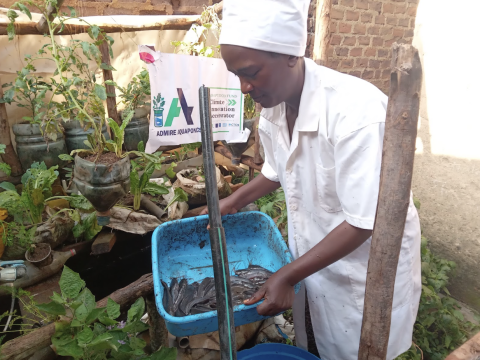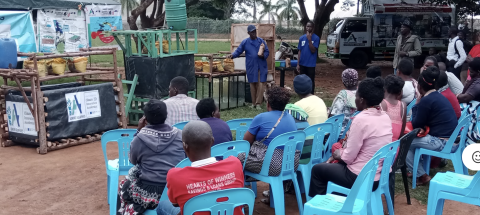Plenty of fish in the tank and seeds in the water for Uganda’s city farmers
Plenty of fish in the tank and seeds in the water for Uganda’s city farmers
In Uganda, urban dwellers are transforming small spaces into fish farms and vegetable gardens using ADMIRE aquaponic kits. Initiated by Sample Uganda, the ADMIRE projects are providing affordable, eco-friendly food sources and inspiring sustainable entrepreneurship in urban areas. This story is part of a series celebrating the locally-led solutions supported by the UNDP implemented - Adaptation Fund Climate Innovation Accelerator programme.
Thousands of Ugandan urban dwellers are turning any available small space into a fish farm, a vegetable garden, or both.
They’re using ADMIRE aquaponic kits, which fit snugly on apartment rooftops, in tiny backyards, and in the corner of any classroom, community centre or kitchen.
In 2017, a group of local fish farmers and entrepreneurs began the ADMIRE Aquaponics Project to bring the technology to people living in Uganda’s urban neighbourhoods.
The group, called Sample Uganda, reports that over 23,000 households have directly benefited from the ADMIRE projects so far. They say this was made possible by a grant from the UNDP-Adaptation Fund Climate Innovation Accelerator (AFCIA) programme, which supports climate innovation in developing countries.
The project's goal is to provide affordable, healthy food sources to urban communities and to create jobs, but without putting further pressure on the environment. Uganda already faces several challenges directly and indirectly linked to the climate crisis, including deforestation, soil degradation, wildlife poaching, unemployment and poverty.
Sample Uganda saw aquaponics is the ideal solution to provide city-dwellers with eco-friendly food and job security.
“Aquaponics are used to grow a variety of vegetables, fruits and fish,” they say in a recent report. “It uses less water than traditional agriculture and does not require the use of pesticides or herbicides.”

They say their compact system is ideal in densely populated urban areas where space is limited and where produce transported from rural areas is often no longer fresh.
“The use of ADMIRE Aquaponics systems among over 23,000 direct beneficiaries has led to a reduction in water and nutrient waste, as well as a decrease in carbon emissions associated with traditional farming practices,” they say in a project report. “Additionally, the increased production of fresh food in these systems has reduced the need for transportation and packaging, further reducing environmental impact.”
Sample Uganda demonstrated the benefits of the kits at market events, churches and schools, showing how ordinary people could use it to start their own businesses.

“For those urban dwellers interested in urban farming, these kits provide an opportunity for a small-scale business, selling the produce to their local communities,” they say.
An open-air market event along the Kampala-Entebbe express highway over the 2022 Christmas holidays attracted a crowd of around 40 000 people, they say.
They also visited the Kitala Seventh Adventist Church for a two-day trade show to give visitors a hands-on tour. “The event was aimed at showcasing the benefits of the project to church-goers and promoting the lease-to-own option to potential customers,” they report.
“By becoming owners of the aquaponics kit at the end of a lease term, users gain self-sufficiency and empowerment in producing their own food sustainably,” says the Sample Uganda team.
The leasing options are based on the size of the kit and the customer’s ability to pay, making the kit highly accessible and affordable to people from all walks of life.

“It enables them to acquire income-generating assets without having to bear the high upfront costs, which can be a significant barrier to entry,” they say. “This model could be replicated in other industries, especially in developing countries, to address the challenge of access to capital.”
To help people start their own businesses, Sample Uganda workshopped business models, investment options and marketing strategies with the leaders of savings and credit cooperatives. They covered skills like writing business and marketing plans, identifying funding sources, managing financial risks and estimating production costs.
“The workshop equipped the leaders with the necessary skills to incorporate micro aquaponics into their business models, and to provide sustainable economic opportunities to their members,” their report says.
The project was not without snags however. The team says there were some cultural barriers that made it difficult to convince farmers of the new technology. And the technology itself had to be optimised to withstand environmental stressors and to function in a way that is climate smart.
Where needed, the team partnered with technical experts to advise them, and they visited schools to raise awareness about sustainable farming practices and to teach the next generation where food really comes from.
The project designed the final system to produce both fish and vegetables in the same, limited space.
“The system combines aquaculture and hydroponics to create a closed-loop system that minimises water usage and maximises plant growth,” they say.
The ADMIRE aquaponics distribution model is ideal, they say, to replicate anywhere where water scarcity is a challenge.
About this article:
This story has been co-created with support from Sample Uganda, UNDP, CDKN, ICCCAD, and GRP, under the framework of the UNDP-managed Adaptation Fund Climate Innovation Accelerator (AFCIA).
The UNDP-AFCIA programme counts on financial contributions from the Adaptation Fund and the European Union and has awarded 44 micro and small grants to locally-led organisations across 33 countries worldwide, accelerating their innovative solutions to build resilience in the most vulnerable communities.
UNDP-AFCIA, is one of the funding windows anchored under the Adaptation Innovation Marketplace (AIM), a multi-stakeholder strategic platform that promotes scaled-up adaptation at the local level, launched by UNDP Administrator Achim Steiner at the Climate Adaptation Summit in January 2021.
